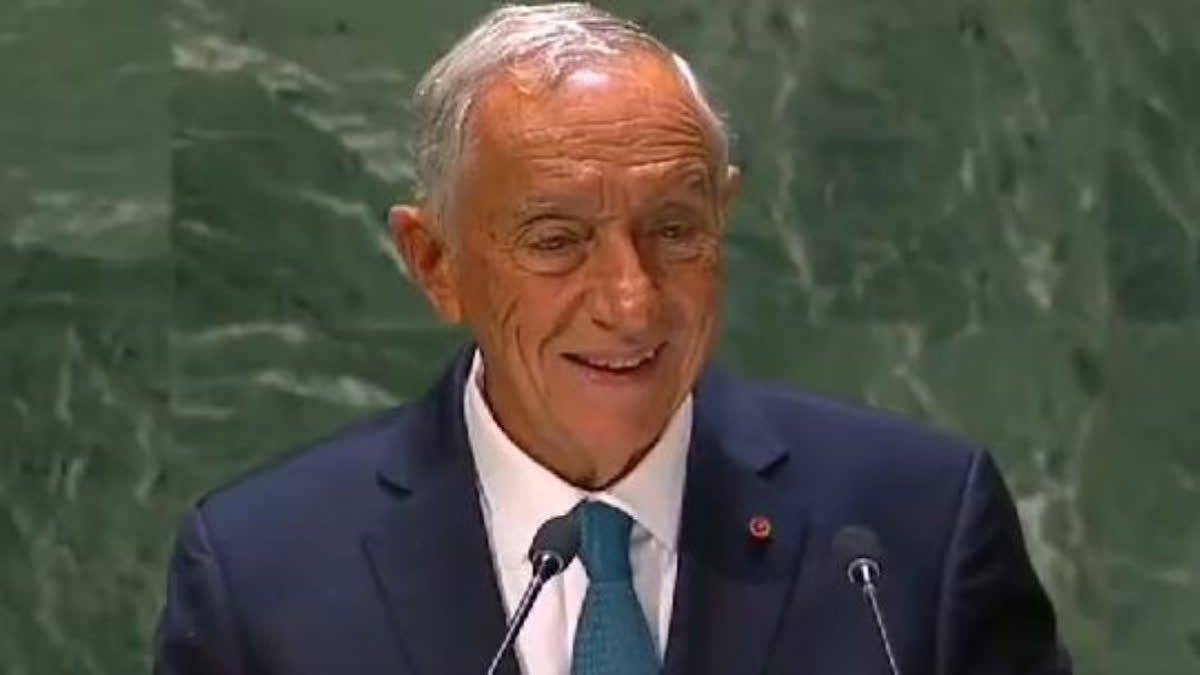New Delhi: In a significant show of support for India and Brazil, Portuguese President Marcelo Rebelo De Sousa addressed the 78th session of the United Nations General Assembly (UNGA) debate, affirming their candidacy as permanent members of the reformed United Nations Security Council. President Rebelo De Sousa emphasized that these countries, with their growing global influence, should not be overlooked in the crucial decision-making body of the UN.
Speaking passionately during his address at the 78th UNGA on a Wednesday, President Rebelo De Sousa remarked, "This decision should be made as these countries (India, Brazil) cannot be ignored." His endorsement of India and Brazil's quest for permanent membership echoes the aspirations of these emerging powers to play a more significant role in shaping international affairs.
Portugal, itself a candidate for non-permanent membership of the Security Council in the 2027-2028 biennium, stands firmly behind the elevation of Brazil and India to permanent members. President Rebelo De Sousa also expressed support for the Common African Position and advocated for the representation of small island countries within the Security Council. Portugal's endorsement of these reforms underscores its commitment to a more inclusive and representative UN Security Council.
"This is all at stake with the war in Ukraine, which is geographically European but has multiple global effects, as insecurity spills over into other regions, such as the Sahel, the Middle East, and Asia, which are more vulnerable to third-party interference, terrorism and new cycles of economic contraction, poverty, and political fragility. To address these threats, Portugal will stand firm in the dialogue between Europe, Africa, and other continents, as our current and future strategic partners", said the Portuguese President.
Also read: 'India at forefront, leading the world on how people, biz have embraced messaging': Zuckerberg
Furthermore, President Rebelo De Sousa articulated Portugal's dedication to promoting transparency, coherence, and accountability within the Security Council. He emphasized their co-sponsorship of initiatives aimed at limiting or scrutinizing the use of the right to veto, a move that aims to enhance the effectiveness and fairness of the Council's decisions.
In a rapidly evolving global landscape where some nations are seeking to reshape the power dynamics, President Rebelo De Sousa highlighted the need to reassess the representation, scope, and effectiveness of international financial organizations. He echoed the sentiments of UN Secretary-General António Guterres, who called for a new international financial architecture akin to a "new Bretton Woods." This call reflects the urgency of adapting global financial systems to contemporary challenges.
President Rebelo De Sousa urged the international community to prioritize the fundamental values enshrined in the United Nations Charter. These include peace, sustainable development, climate action, the rectification of inequalities, and the reform of both the United Nations and the world's financial institutions. His remarks underscored Portugal's commitment to promoting a more equitable and just world order.
Turning his attention to the ongoing Russia-Ukraine conflict, President Rebelo De Sousa underscored the importance of distinguishing the rightful struggle of the Ukrainian people from the rightful defence of the United Nations. Failing to make this distinction, he argued, would result in acquiescing to illegitimate and illegal aggression, thereby compromising the effectiveness of multilateralism and endangering millions of human lives.
Addressing the global climate crisis, President Rebelo De Sousa called for urgent and ambitious cooperation to combat climate change. He highlighted the increasing frequency of extreme and abrupt climate-related phenomena and emphasized the critical role of science in informing political decisions. Reinforcing the centrality of science in climate policy is essential to addressing the impending environmental challenges effectively.
In a notable absence, Indian Prime Minister Narendra Modi chose to skip the 78th UNGA session, with External Affairs Minister S Jaishankar representing India instead. Jaishankar is scheduled to address the General Debate on the last day of the high-level week, September 26. India's priorities during this session include its role as G20 President, with a focus on issues vital to the Global South, counter-terrorism efforts, Security Council reform, and peacekeeping missions.
In summary, Portuguese President Marcelo Rebelo De Sousa's address at the 78th UNGA session serves as a significant endorsement of India and Brazil's aspirations to secure permanent membership in the reformed UN Security Council. His call for transparency, inclusivity, and accountability within the Council, along with his support for international financial reform, reflects Portugal's commitment to a more equitable and just global order. Additionally, his remarks on pressing global issues such as the Russia-Ukraine conflict and climate change underscore the urgency of international cooperation and the need for collective action.
Also read: US in active talks with India to look at producing military systems, says Pentagon official



